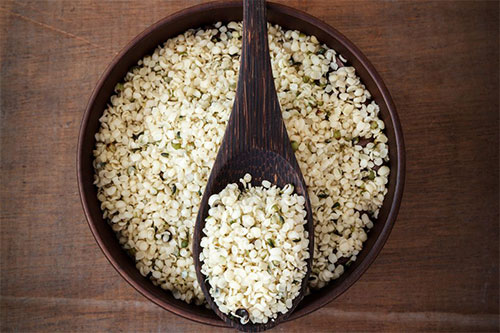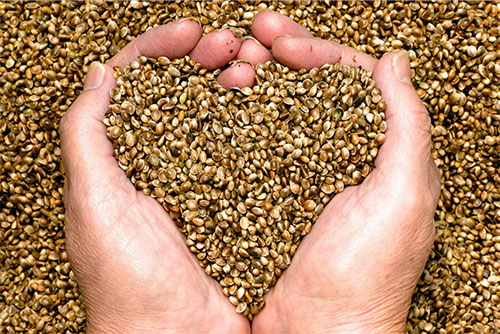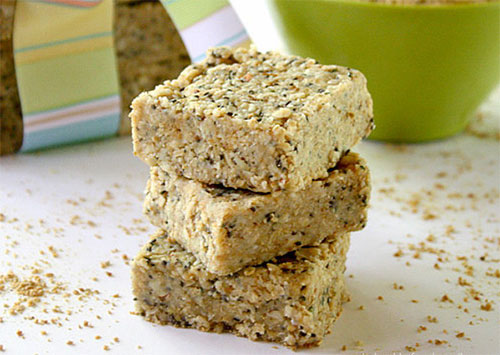Hemp Seeds help fight Cancer, Cardiovascular Disease and Skin Disorders

Although marijuana and hemp are members of the same species, Cannabis sativa, they are in effect completely different plants. About a dozen varieties of hemp plants are cultivated for food, and they contain about 0.001 percent the main psychoactive ingredient in marijuana known as THC or Tetrahydrocannabinol. Because of its botanical relationship to drug/medicinal varieties of Cannabis, hemp seeds were ignored for their nutritional benefits for a long time.
So, hemp seeds don’t cause any psychotropic reaction and with their unique nutritional profile may provide significant health benefits.
This means you can consume as much hemp as you want and you’ll never get high or fail a drug test. Even though certain countries have begun to legalize the cultivation of industrial hemp, the hemp seeds you can find at your health food or grocery store were likely grown in China or Canada.
After more than 12 years of research, experts from the University of Minnesota’s College of Biological Sciences and College of Food, Agricultural, and Natural Resource Sciences found that for the genetic differences between marijuana and hemp is responsible a single gene. Also, they believe they have “indisputable evidence” that marijuana and hemp should be regarded as separate plants.
Hemp is a high-growing plant with sturdy fibers perfect for making paper, rope, and fiber. The plant purifies the soil around it, thrives without pesticides, and kills weeds.
In fact, hemp is a truly healthy sustainable crop for our environment and most hemp on the market is naturally organic and non-GMO.
Some of the more commercial uses include:
– Health foods;
– Building materials;
– Textiles;
– Body care products;
– Plastics;
– Cleaning products.
With their excellent nutritional value, they may boost your health. Hemp seeds, also known as “hemp hearts”, are rich in vitamins, minerals, healthy fats, and protein. Just 100 grams of hemp seeds contain:
– Minerals;
– Phosphorus – 1160mg;
– Potassium – 859mg;
– Magnesium – 483mg;
– Calcium – 145mg;
– Iron – 14mg;
– Manganese – 7mg;
– Zinc – 7mg;
– Vitamin A – 3800 IU mg;
– Vitamin B1 – 0.4mg;
– Vitamin B2 – 0.11 mg;
– Vitamin B3 – 2.8 mg;
– Vitamin B6 – 0.12 mg;
– Vitamin D – 22.77.5 IU mg;
– Vitamin E – 90 mg IU mg.
For consuming the hemp seeds, first you must remove the hard outer shell in order to get to the creamy and soft “heart”. They have a slightly nutty flavor, and they are incredibly versatile for use in smoothies, salads, cooking and baking.
According to research published in Nutrition & Metabolism, hemp seeds contain an ideal proportion 3:1 of omega-3 and omega-6 fatty acid which promote cardiovascular health.
Hemp seeds also contain gamma-linolenic acid (GLA), which supports the growth and normal function of cells, muscles, nerves, and organs throughout your body.
Hemp Seeds Health Benefits

1. Prevent Cardiovascular Disease
The omega-3s in hemp oil and hemp seeds have high levels of alpha-linolenic acid (ALA). This is another fatty acid which seems to “have a stabilizing effect on the heart”.
Two types of omega-3, docosahexaenoic acid (DHA) and eicosapentaenoic acid (EPA) help reduce risk factors for heart disease, including high blood pressure and high cholesterol.
These three fatty acids not only prevent abnormal heart rhythms and lower your heart rate, but they also lower blood pressure.
Hemp seeds are also high in amino acid arginine, which produces nitric oxide in the body. It makes the blood vessels relax and dilate, leading to reduced risk of heart disease and lowered blood pressure.
In one study of more than 13.000 people, decreased levels of C-reactive protein (CRP) were linked with increased arginine intake.
The gamma-linolenic acid (GLA) found in hemp seeds also can reduce inflammation, which on the other hand, may decrease the risk of diseases like heart disease.
Add 2 tbsp of hemp seeds to your morning cereals or smoothie to naturally raise HDL cholesterol, reduce LDL cholesterol, improve triglycerides and lower blood pressure.
2. Digestive Health
High in soluble (20%) and insoluble (80%) fiber, hemp seeds provide amazing support your digestive health.
They may also regulate cholesterol levels and reduce spikes in blood sugar.
However, shelled or de-hulled hemp seeds contain small amounts of fiber because the shell which is fiber-rich has been removed.
3. Cancer
Because of its perfect fatty-acid profile of GLA and omega-3 fats, this helps naturally strengthen the immune system and balance inflammation levels.
According to the British Journal of Cancer, the THC in hemp seeds can possibly reverse and stop a glioblastoma multiforme which is a deadly form of brain cancer.
The journal of Breast Cancer Research and Treatment showed that CBD inhibits human breast cancer cell invasion and proliferation.
Researchers from the Institute of Toxicology and Pharmacology, University of Rostock, Germany discovered that active ingredients in cannabis have the ability to truly kill cancer cells. They found that both active substances originating from cannabis, tetrahydrocannabinol (THC) and cannabidiol, contribute to the destruction of tumor cells. Their research revealed that even at very low concentrations of cannabidiols significantly slowed the invading cervical and lung cancer cells.
4. Reduce Symptoms of PMS and Menopause
Women of reproductive age, up to 80 percent, may suffer from emotional or physical symptoms caused by PMS – premenstrual syndrome.
The hormone prolactin is responsible for these symptoms.
As mentioned before, hemp seeds contain gamma-linolenic acid (GLA), which decreases the effects of prolactin.
In one study women with PMS who were taking 1 gram of essential fatty acids (including 210 mg of GLA) daily resulted in a significant lowering in symptoms.
Due to the high content of GLA, several studies have shown that hemp seeds may also help lower the symptoms of menopause, regulate inflammation and hormone imbalances associated with menopause.
5. Skin Disorders
Hemp oil is oftentimes used in high-end cosmetic products such as soaps, lotions, and lip balms. It penetrates the inner layers of the skin and promotes healthy cell growth.
Hemp seed oil may also improve itchiness, relieve dry skin and reduce the need for skin medication.
Because this oil works perfectly for skin disorders such as eczema and psoriasis, to maximize these benefits eat at least 1-2 tablespoons of hemp seed daily.
You can also prepare a homemade skin cream by mixing shea butter, hemp seed oil, and essential oils.
6. Weight Loss

Hemp can help you reduce sugar cravings, feel full longer and works as a natural appetite suppressant.
Add 4 tablespoons of hemp seeds to your breakfast in order to curb excess hunger the entire day.
7. Arthritis and Joint Pain
Consuming the stand alone gamma linolenic acid (GLA), found in hemp seeds, can reduce arthritis symptoms. Actually, one study shows that GLA is an effective and well-tolerated treatment for active rheumatoid arthritis (RA).
Take 1 tbsp of hemp seed oil once a day.
8. Plant-Based Protein
If you’re going vegan, you’re in luck. Hemp seeds are a perfect healthy source of protein if you are following a plant-based diet. Just 2 or 3 tablespoons of hemp seeds complete with the amino acids cysteine, lysine, and methionine provide about 11 grams of protein. Edestin and albumin are two main proteins in hemp seed protein. They are rich in essential amino acids with profiles comparable to egg white and soy.
Hemp also contains the highest amounts of edestin among all plants.
Another good thing is that hemp protein because of its lack of trypsin inhibitors and oligosaccharides is easy to digest.
How To Use Hemp Seeds
Eating hemp hearts, or shelled hemp seeds, is as simple as sprinkling a spoonful or two on top of salads, cereal, or yogurt or into smoothies.
Since they are gluten-free people with gluten sensitivity can use them as a substitute for breadcrumbs.
You can prepare your own hemp seed milk just like you blend almonds and water to make almond milk.
Hemp seeds have a nutty flavor, so they make a great substitute for people with nut allergies.
Since its delicate omega fatty acids can break down during the cooking process, hemp seed oil should be used only as a finishing oil. Use it for salad dressings, or drizzle over grilled veggies, pasta, or popcorn.
yogaesoteric
December 19, 2017
